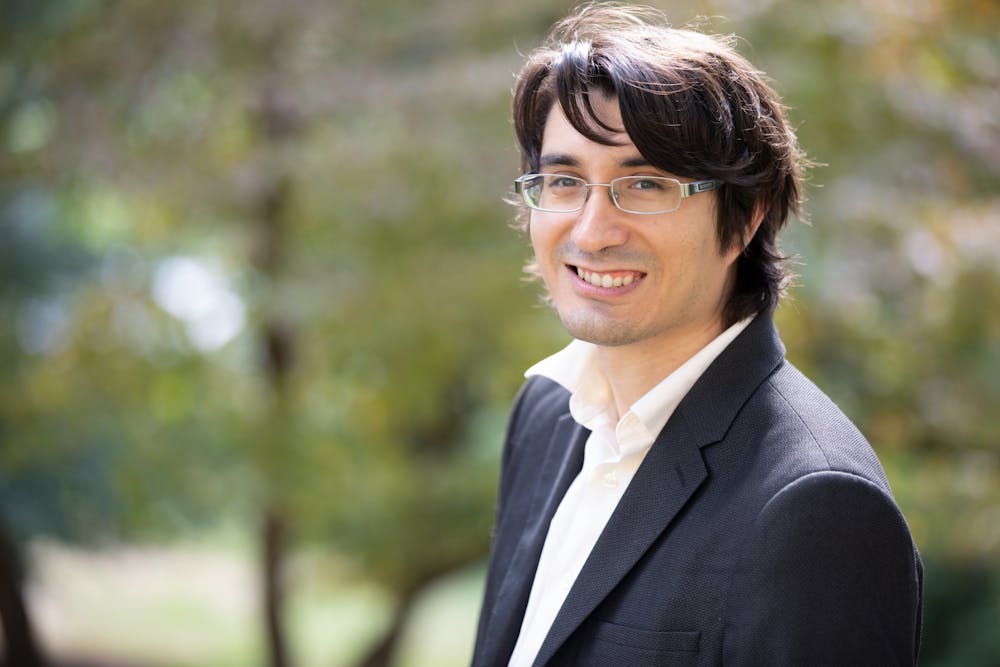Graduate/Professional Young Trustee finalist Eric Juarez, Graduate School ’22, hopes to improve the infrastructure of higher education in its integration of both students and faculty in a shared system of leadership.
Juarez is also the current Consortium for Faculty Diversity fellow and visiting lecturer in the psychology and education department at Mount Holyoke College. He studied psychology at Harvard College before attending Duke for his doctorate degree in psychology and neuroscience.
While at Duke, he served on the Board of Trustees’ Next Generation Living and Learning Experience Task Force, where he had the opportunity to bring his experience from Harvard’s residential college system to Duke.
On the task force, Juarez worked towards establishing the QuadEx residential housing system that is implemented today.
“Being able to see at this point the QuadEx program, which is the direct outcome of that work we did five years ago, has been just such an amazing experience,” Juarez said.
His experience on the task force is one of the factors that drew him to the Board of Trustees. “I was amazed at the integrity and the passion that our trustees have for Duke as an institution,” he said.
Juarez also served on the Strategic Education Sessions and the Graduate and Professional Education and Research Committee, both of which gave him the opportunity to “see how they have continued to give back to the institution.”
He sees the higher education system as being at a turning point in terms of economic, social and cultural conditions. This “pivotal moment” brings up questions like, “How are we integrating our students … in a shared model of teaching? And how are we committed and maintaining this commitment to developing our students, as well as our staff and faculty, to be ethical leaders going forward?” Juarez asked.
He noted that in the wake of the pandemic, academic support jobs at universities, including Duke, have been more difficult to fill. But Juarez also sees this as “an opportunity to really rethink the structure of the University and thinking at a high level,” such as whether employees feel valued or able to contribute, or how Duke can restructure its infrastructure to “put our best foot forward in the face of these challenges.”
Juarez’s training at Duke lies in the Institute for Brain Sciences and the Center for Cognitive Neuroscience, where he was a graduate student of neuroeconomics. His research at the time centered around the intersection of imagination and decision-making. At Mount Holyoke College, he also focuses on career decision-making and workforce training. Juarez hopes to bring this interdisciplinary approach to the Board of Trustees.
He emphasized that one perspective he heavily considers is “thinking strategically about the structure of our graduate professional and undergraduate programs, and our certificate programs as well, to give students the opportunity to develop a deep understanding of disciplinary methodological practice, and yet also have the breadth to be able to apply that to many of the wicked problems of today.”
Now serving as a faculty diversity fellow and visiting lecturer at Mount Holyoke College, Juarez has been able to see the other side of the education system. As an educator, he has learned the great amount of knowledge that faculty can learn from their students, as well as the value of this relationship.
“It’s an exercise in intellectual humility how much we can learn from the diverse perspectives of other students,” Juarez said.
As Graduate Young Trustee, Juarez would prioritize including students from diverse backgrounds both domestically and internationally, including economic backgrounds. He believes that creating a forum for varying viewpoints will be especially necessary for solving modern issues, such as the rise of advanced AI and financial crises.
“By bringing together these unique and diverse perspectives, we can tackle these problems together,” Juarez said.
While at Duke, Juarez worked with Jessica Sperling, lead of the applied research, evaluation, & engagement area in Duke’s Social Science Research Institute, on a Bass Connections team which tackled equitable University-community research partnership.
Juarez’s character and collaboration stood out to Sperling. “Eric was consistently a thoughtful contributor in this project and a great collaborator with other team members. He took a valuable critical lens on our topic and our project, including its goals and processes, and I always appreciated the ways he helped to advance our conversation and ultimately our work,” she wrote in an email.
Although it was his final year of his doctorate degree, Juarez still wanted to work to improve Duke’s relationship with communities and their integration into the University’s infrastructure.
Juarez joining at this time “spoke to me of a genuine interest in these topics, a true desire to inform workings at Duke, and potentially a focus on the structures of scholarship and learning,” Sperling wrote, “as well as embedded civic responsibility, ongoing in his career.”
Get The Chronicle straight to your inbox
Signup for our weekly newsletter. Cancel at any time.

Michelle Brown is a Trinity junior and an editor-at-large of The Chronicle's 120th volume.

